The World Rowing Championships is an international rowing regatta organized by FISA. It is a week-long event held at the end of the northern hemisphere summer and in non-Olympic years is the highlight of the international rowing calendar.

Rowing has been part of the Summer Olympics since its debut in the 1900 Games. Rowing was on the program at the 1896 Summer Olympics but was cancelled due to bad weather. Only men were allowed to compete until the women's events were introduced at the 1976 Summer Olympics in Montreal which gave national federations the incentive to support women's events and catalysed growth in women's rowing. Lightweight rowing events were introduced to the games in 1996. Qualifying for the rowing events is under the jurisdiction of the World Rowing Federation. World Rowing predates the modern Olympics and was the first international sport federation to join the modern Olympic movement.
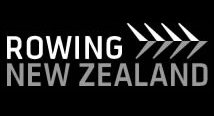
Rowing New Zealand is the sports governing body for rowing in New Zealand. Its purpose is to provide leadership and support to enable an environment of success for the New Zealand rowing community. This includes secondary schools, clubs, masters, universities and high performance.
Conrad Christian Robertson is a former New Zealand rower who won an Olympic Gold medal at the 1984 Summer Olympics in Los Angeles.
Ian Andrew Wright is a former New Zealand rower who won an Olympic bronze medal at the 1988 Summer Olympics in Seoul. Wright won 31 national titles during his career. After his rowing career ended, he became a coach and his Swiss lightweight men's four team won gold at the 2016 Summer Olympics. He was announced as Australia's head rowing coach in September 2016. He immediately coached the Australian men's four to a gold medal at the 2017 world rowing championships in Sarasota, Florida.
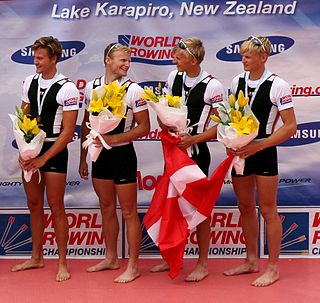
The 2010 World Rowing Championships were World Rowing Championships that were held from 31 October to 7 November 2010 on Lake Karapiro near Cambridge, New Zealand. The annual week-long rowing regatta was organised by FISA. Usually held at the end of the northern hemisphere summer, they were held later in the year in the southern hemisphere. In non-Olympic years the regatta is the highlight of the international rowing calendar.

The 2015 World Rowing Championships were World Rowing Championships that were held from 30 August to 6 September 2015 at the Lac d'Aiguebelette, Aiguebelette-le-Lac in France.
Fiona Paterson is a New Zealand rower.
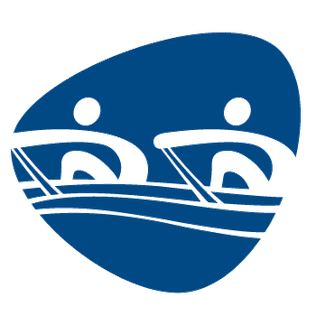
The rowing competitions at the 2016 Summer Olympics in Rio de Janeiro took place from 6 to 13 August 2016 at the Rodrigo de Freitas Lagoon in Lagoa. Fourteen medal events were being contested by 547 athletes, 334 men and 213 women.
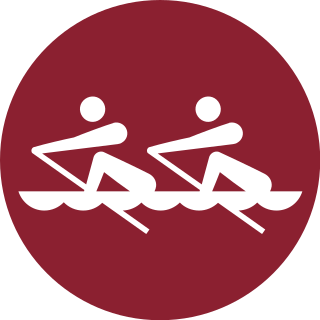
The rowing competitions at the 2020 Summer Olympics in Tokyo took place between 23 and 30 July 2021 at the Sea Forest Waterway in Tokyo Bay. Fourteen medal events were contested by 526 athletes.

Grace Elizabeth Prendergast is a former New Zealand sweep rower. She is a 15-time national champion in the premier category, an Olympic champion, a five-time world champion and the current (2022) world champion in the coxless pair. She grew up in Christchurch, where she started rowing for the Avon Rowing Club in 2007. She competed at the Tokyo Olympics in two boat classes and won gold in the coxless pair and a silver in the eight and set a new world's best time in the pair. Various parties, including the World Rowing Federation, expected her to win medals in Tokyo. She was the highest ranked female rower in the world twice in a row in 2019 and 2021. Since 2014, her rowing partner in the coxless pair has been Kerri Gowler. Prendergast is also a Boat Race winner, having competed as part of Cambridge University Boat Club's (CUBC) women's crew in 2022. She retired from professional rowing in October 2022.
The 1974 World Rowing Championships was the fourth World Rowing Championships. It was held from 4 to 8 September 1974 and from 29 August to 1 September 1974 on the Rotsee in Lucerne, Switzerland. The event was significantly extended from the 1970 edition, with the addition of both women's and lightweight men's events. Six women boat classes were added, three lightweight men classes, plus quad scull for men, increasing the number of boat classes from seven in 1970 to seventeen in 1974. This was also the last World Championships held on a quadrennial cycle – from this point, World Championships were held annually.
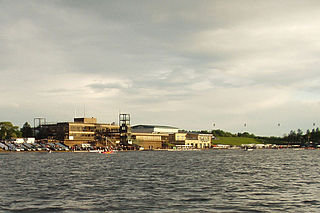
The 1975 World Rowing Championships was the fifth World Rowing Championships. It was held from 21 to 30 August at Holme Pierrepont National Watersports Centre in Nottingham, England, United Kingdom.
The 1977 World Rowing Championships was the 6th World Rowing Championships. The championships were held from 19 to 28 August 1977 on the Bosbaan rowing lake in Amsterdam, Netherlands.
The 1987 World Rowing Championships were World Rowing Championships that were held from 29 to 30 August 1987 in Copenhagen, Denmark while it was "outrageously windy".

The 2017 World Rowing Championships were the 47th edition of the World Rowing Championships that were held from 24 September to 1 October 2017 in Sarasota, Florida.
The 1978 FISA Lightweight Championships were held in Copenhagen, Denmark from 3 to 6 August 1978. In the history of the World Rowing Championships, 1978 was the only year when the lightweight rowing championships were not held in conjunction with the open men and women event. The lightweight finals were raced on 6 August. The event was held at Lake Bagsværd. In 1978, a fourth boat class was added to the event: Lightweight double scull.
Ian John Wilson is a retired British lightweight rower who competed for Great Britain.
Phoebe Spoors is a New Zealand rower. From Christchurch, she was an unused reserve in the New Zealand women's eight at the 2020 Tokyo Olympics in which her elder sister Lucy won a silver medal. In an unusual career progression for a New Zealand rower, she never represented the country as an age-group rower but joined the national team after several years in the United States for fulltime rowing at the University of Washington combined with tertiary study.










